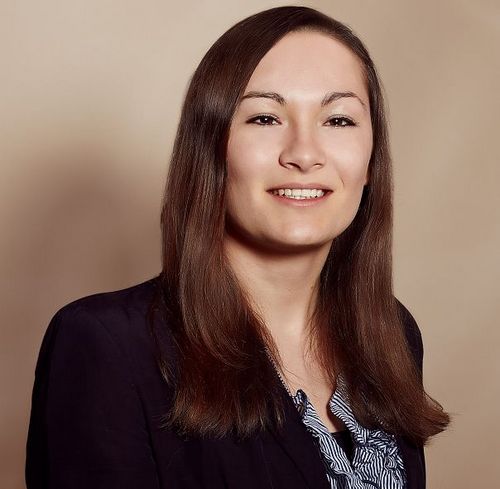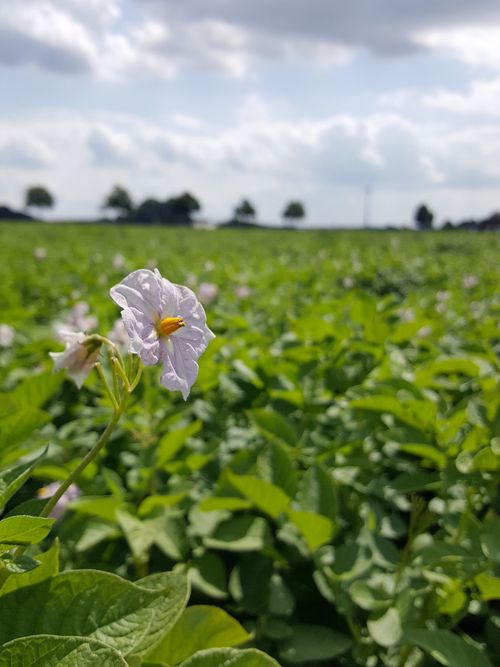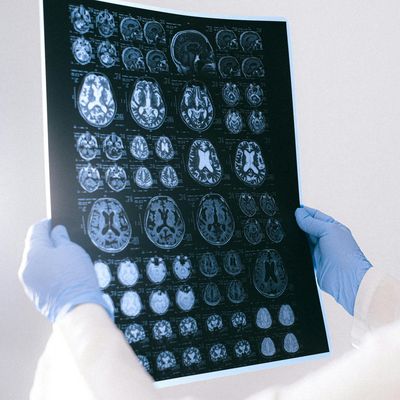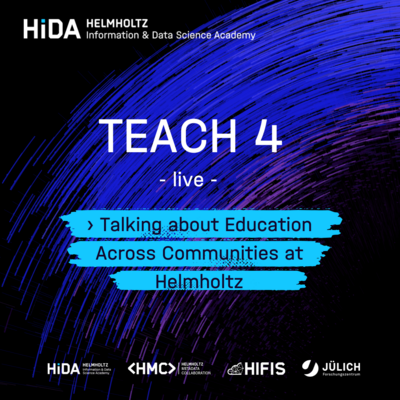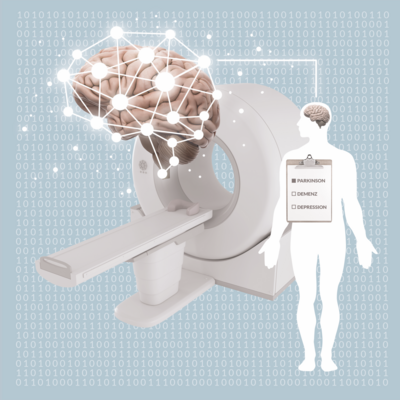Climate change on our plates
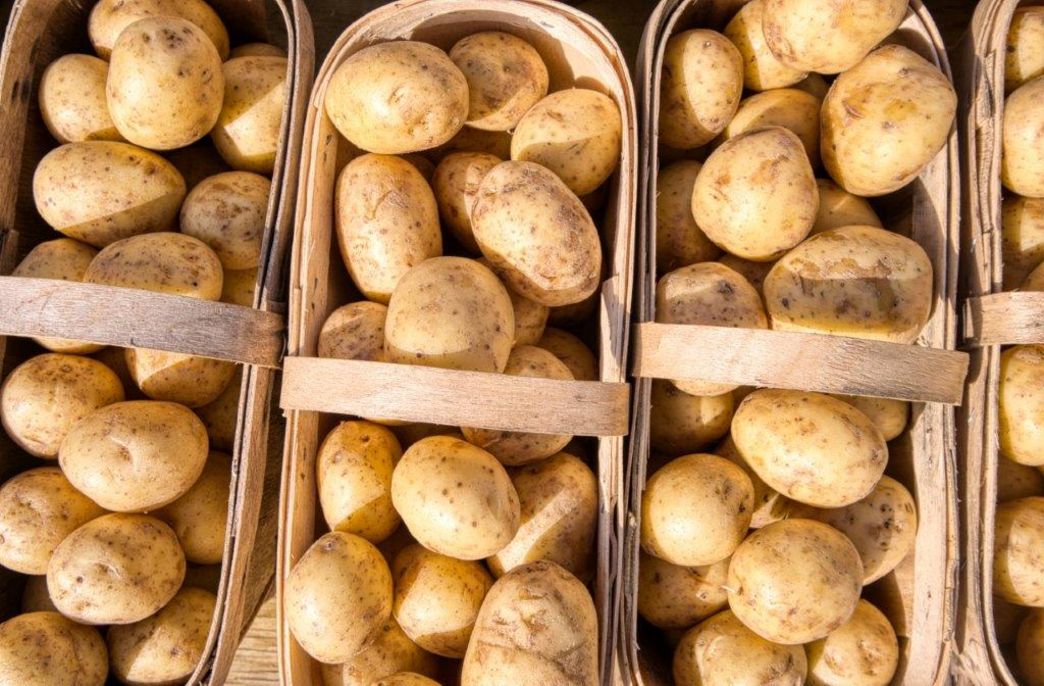
Threatened potato crop: Sabine Egerer from Helmholtz Zentrum Hereon used Data Science to research what the future of agriculture might look like under climate change, using potatoes as an example - an exchange with the HIDA Trainee Network helped.
It is impossible to imagine German plates without the potato. Although consumption of the South American tuber is declining in Germany, according to the Federal Agency for Agriculture and Food (Bundesanstalt für Landwirtschaft und Ernährung - BLE), 55 kilos are still eaten per capita in this country every year. The demand for cultivation area is therefore still high. Climate scientist Sabine Egerer proves that the potato is not only of agricultural importance, but also a true crossover research object. At the Hamburg Climate Service Center GERICS of the Helmholtz Center Hereon, she has been working in the IMLAND research project since 2018, where her research on the potato combines questions of climate change and the future of agriculture with data science methods - all in the interest of Germany's most typical field crop.
Data Science Network for Young Scientists
Egerer is looking into the question of how climate change will affect potato yields in Germany and to what extent possible yield losses can be compensated for by irrigation. In order to calculate whether and how climate change will affect our plates in the future, extensive model calculations are necessary in which many variables must be included. However, since the Hamburg research group lacked expertise with statistical crop modeling, Egerer came up with the idea of getting help from elsewhere: She became aware of the Helmholtz Center for Environmental Research UFZ through a paper by scientist Michael Peichl, who models the influence of soil moisture on crop yields - also an interesting aspect for Egerer's potato problem. A Hamburg colleague, in turn, pointed out to her the opportunity to network professionally with colleagues at other Helmholtz centers via a guest stay and to get new ideas from the data sciences, supported organizationally and financially by the newly launched HIDA Trainee Network.
This network, first launched in 2020, is aimed at PhD students and postdocs in the Helmholtz Association who want to expand their data science expertise across disciplines, and offers fully funded research fellowships for short-term stays at other Helmholtz centers. The goal of such exchanges: to benefit from each other's data science expertise, to network, and to learn about new approaches and ways of working. The sending centers and the hosts can also expand and strengthen their network within the Helmholtz Association through the collaboration. Despite the difficult Corona situation, which limited face-to-face exchanges with researchers, Egerer was highly motivated for a stay in Leipzig: "I really wanted to learn about new methods in machine learning and integrate soil moisture into my model. The Computational Hydrosystems group at UFZ are experts in hydrological modeling, and there's a lot of experience there in terms of data processing and machine learning algorithms."
Drought threatens potato crop
In northeastern Lower Saxony, not far from the GERICS site, the problem Egerer is studying is within reach: this is where Germany's largest potato-growing areas are located. If a season turns out to be particularly dry, the potato harvest can suffer severe losses. Although this has only happened sporadically so far, it is foreseeable that climate change will have a major impact on German potato cultivation in the future. This has a direct economic impact on consumers, as prices rise with lower supplies - and intensified irrigation of the fields also incurs costs and depletes groundwater supplies. Since potatoes basically have to be irrigated artificially due to their shallow root system, irrigation is a key factor for future yields. But how drastically will climate change affect the harvest and how could irrigation be adapted?
Modeling crop scenarios - in cooperation between Hamburg and Leipzig
For the Hamburg climate scientist, who was one of the first scientists to participate in the trainee network between November 2020 and January 2021, the support of her colleagues from the Computational Hydrosystems Department at the UFZ in Leipzig came just in time. For her project entitled "Towards a statistical approach for agricultural yield production to evaluate climate change adaptation measures for present and future conditions", she was able to develop a model with the help of the UFZ in which the effect of irrigation on the harvest can be represented under different emission scenarios. In the process, she tested possible irrigation scenarios to learn the extent to which irrigation could compensate for future yield losses. Egerer said her colleagues also familiarized her with various data processing processes. "The greatest benefit of my exchange," the scientist is convinced, "was certainly the expansion of my knowledge of machine learning algorithms." Egerer was able to apply this new knowledge to select the most important climatic and hydrological variables responsible for variations in crop yield. In addition, the scientist was able to access a lot of data at the UFZ, such as climate data from the Helmholtz Climate Initiative, weather data from the German Weather Service and data from the Soil Moisture Index (SMI).
These are based on a model developed by the Leipzig hosts. Regular virtual meetings enabled contact with the Leipzig team. Sabine Egerer is certain: "The official framework of the HIDA trainee network has facilitated data access and scientific exchange."
The harvest of her stay at the UFZ: a successfully submitted abstract to the European Geophysical Union (EGU) and the presentation of her results at the EGU online conference. Together with the teams from Leipzig and Hamburg, a publication is additionally planned. "The most important insight for me is that a fruitful exchange is possible even without extensive direct contact." Her verdict on her stay in Leipzig is unequivocal: "I would definitely recommend participation in the HIDA Trainee Network to other scientists, especially if they want to include external expertise in their work, find new collaborations and gain new ideas."
For stable yields: More water or fewer emissions
But what about the German potato specifically, this complex research subject? Egerer's model shows that in the business-as-usual emissions scenario, which results in the highest temperature increase, high crop losses of more than one-third can be expected by the end of the 21st century without irrigation. With conventional irrigation, these losses are reduced to only 23%, or 17% if the amount of water is doubled. A high price. So what the harvest will actually look like and what additional costs will be incurred in the future will depend very much on how much CO2 emissions can be curbed. Egerer's model, to which the UFZ-GERICS collaboration contributed, thus sharpens the view of the climate future in agriculture.
However, participation in the HIDA Trainee Network was fruitful for Sabine Egerer in another sense besides the successful research collaboration: "It became clear to me that I would like to continue working with statistical methods and machine learning algorithms in such a relevant field as agriculture. In this sense, the exchange has helped me to concretize my future plans in science."
Curious? Those interested in the HIDA Trainee Network can apply to participate again in the next round. More info on the preparation and exact dates of the next call can be found here.
Author: Constanze Fröhlich

